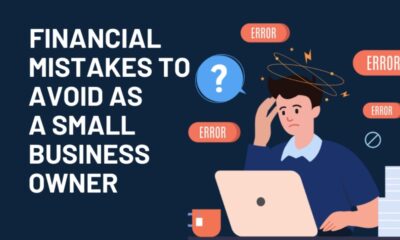Education
Best Certifications in Accounting and Finance to Close the Digital Skills Gap

The finance and accounting industries appear to be at a turning point globally, propelled by swift technological advancements. Accounting and finance professionals’ roles are expanding beyond simple number-crunching and balance sheet tallying as even the most routine tasks in these fields become automated. Consequently, several recently developed and emerging fields, such as big-picture business strategy, risk management, and strategic decision analysis, are now being recognized as essential core competencies.
Increasing headcount alone won’t address the skills gap that organizations are currently facing, even though actively seeking out new accounting and finance talent is crucial. The fact is that even seasoned workers today frequently lack the cutting-edge skills needed to successfully traverse our quickly changing digital environment. Their training and development programs, which emphasized conventional accounting methods that are currently being automated or rendered outdated by new technologies, were created for a different era.
On the other hand, modern companies require a different kind of accounting and finance specialists—those who can use disruptive technologies like cloud computing, artificial intelligence, and data analytics to support strategic decision-making. They require experts in areas such as value creation, competitive analysis, risk modeling, and converting complex digital outputs into useful business insights. In other words, the abilities that once allowed accountants to succeed are no longer necessary for success in the modern era.
To bridge this growing skills gap, more traditional accountants must be hired or compensation must be increased. Short-term pipeline strength depends just as much on the ongoing upskilling of the current workforce as it does on attracting new talent. To keep up with the constant disruption caused by technology, the accounting profession as a whole needs to adopt a mindset of continuous learning, unlearning, and relearning.
Organizations ought to make significant investments in creating CEU programs that enable seasoned professionals to augment their basic accounting knowledge with digital skill sets that are relevant to the future. For accounting teams to stay relevant and indispensable in our quickly changing business world, a vibrant culture of lifelong learning is necessary, covering everything from data science and cloud proficiency to strategic analysis and automated process implementation.
To close the gap in tech skills, the following six notable certifications for finance and accounting professionals are listed:
- Certified management accountant (CMA)
The internationally recognized gold standard certification for management accountants is the CMA from the Institute of Management Accountants (IMA). It exhibits proficiency in vital domains such as corporate finance, analytics, technology, risk management, and decision analysis. The CMA denotes strategic competencies that go beyond the fundamentals of accounting.
- Certified public accountant (CPA)
For accountants working in public practice areas such as auditing, taxation, and consulting, the CPA license continues to be the most valuable and prestigious certification available. The CPA now needs expertise in data analytics, information systems, business strategy, and other areas as technology is changing these fields.
- Certified information systems auditor (CISA)
The ISACA CISA certification verifies proficiency in information systems governance, cybersecurity, systems auditing, and risk management as businesses become more digitally oriented. It guarantees that experts in accounting can assess technology risks and provide guidance on controls.
- Certified analytics professional (CAP)
With this INFORMS certification, candidates will be well-versed in all aspects of data analytics, including how to formulate questions, mine data, model, conclude, and present findings. For accounting positions involving Big Data, it is imperative.
- Certified global management accountant (CGMA)
The CGMA certification, jointly offered by AICPA and CIMA, assesses candidates’ knowledge of risk management, technology and systems, leadership, business operations, and decision-making in strategic management accounting. It focuses on financial experts who work for international corporations.
- Certified in strategy and competitive analysis (CSCA)
The essential strategic and analytical abilities that accounting leaders are increasingly in need of are taught in the new IMA CSCA certification. This entails assessing the competitive environment, spotting market openings, successfully implementing strategy, and tracking output and value generation.
Conclusion
A new breed of tech-savvy, strategically-minded accounting and finance professionals is thus required due to the rapid pace of digital disruption. These top certifications give employees the future-ready skills they need to lead decisions, add value, and revolutionize their companies in a time of constant change.
-

 Gadget4 weeks ago
Gadget4 weeks agoAfter Grand Success on BLDC Ceiling Fan, Eff4 Is Launching Smart Bulb
-

 Festivals & Events4 weeks ago
Festivals & Events4 weeks agoGoogle Celebrates Cherry Blossom Season with Animated Doodle
-

 Business2 weeks ago
Business2 weeks agoPrakash and Kamal Hinduja: Driving Social and Environmental Change
-
Education3 weeks ago
Fred DuVal: University Leadership as a Critical Resource for Climate Change Research and Life-Saving Solutions
-

 Health2 weeks ago
Health2 weeks agoThe Hinduja Brothers Commitment to Global Health: Empowering Communities Across Borders
-

 Cryptocurrency3 weeks ago
Cryptocurrency3 weeks agoDesigned For The Masses: How Akasha (AK1111) Is Unlocking Crypto For The Next Billion Users
-

 Cryptocurrency3 weeks ago
Cryptocurrency3 weeks agoNexaglobal & Future World Token (FWT): Could This Be the Next Big Crypto Investment of 2025?
-

 Sports4 weeks ago
Sports4 weeks agoWomen’s NCAA Tournament 2025 Sweet 16: Full Schedule, Fixtures, Teams, Bracket, and How to Watch March Madness Basketball Match Live

























